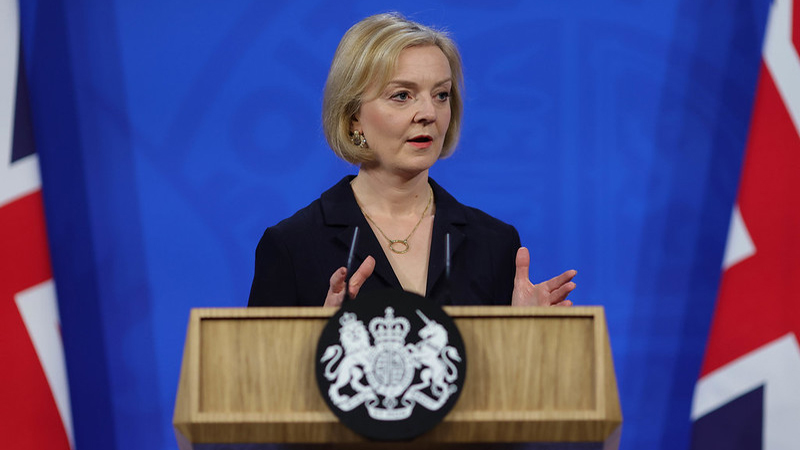Freshly-minted chancellor Jeremy Hunt managed to restore some stability to gilt markets, with the reversal of almost all the measures listed in Kwasi Kwarteng’s mini-budget. For the time being, his prompt action has halted an historic sell-off in the UK government bond markets. However, yields are not yet back to their level pre-budget and appear still to be pricing in an ‘unreliability’ premium. Can investors expect this premium to reverse from here?
The UK 30-year gilt has become a bellwether for confidence in the UK economy. After the chancellor’s speech, the yield dipped approximately 0.5 percentage points to 4.4%, suggesting the reversal of the more explosive mini-budget measures had gone some way to re-establishing the UK’s economic credibility. However, it remains around one percentage point higher than it was prior to the ill-advised fiscal event, which implies that the UK’s reputation is not yet restored in full.
The scale of the drop in UK government bond prices has been significant. Jonathan Golan, portfolio manager at Man GLG, pointed out that bond markets had been assuming that the Bank of England base rate would peak at over 6%, one of the highest rates seen since the central bank became independent in 1997. It is now predicting a peak of 5%, less alarming, but still a shock for the UK economy and for many mortgage holders.
In the short term, the question is whether the chancellor has done enough to calm markets. The verdict appears to be that he has, but markets remain on high alert. George Lagarias, chief economist at Mazars, says: “The UK is firmly in the sights of so-called ‘bond vigilantes’, who have, historically, exerted a lot of pressure on governments and central banks. In the past, the solution has come through general elections, technocratic governments and so on.
“Having said that, we believe that the UK is in a much stronger position than other countries. It has much lower debt, a broader economy and a great track record in keeping spending from getting out of control. For lack of a better word, it has ‘street credibility’, accumulated investor goodwill. There is damage for sure, but if British governments exhibit prudence and a willingness to reconcile with their largest trading partners, we think the damage can be reversed.”
Golan says that a rate rise to 6% always seemed unlikely: “In previous cycles, the Bank of England has only been able to raise up to 200bps before plunging the economy into recession and needing to unwind its course. Here, we had 600bps of rate hikes priced in.”
As a result, he believes gilts may now be starting to look attractive, particularly if the current fragile stability endures. Inflation may start to come down in the second quarter of 2023 and may decline quite quickly. He says: “The UK has high interest rates priced in, coupled with slowing inflation from second half of next year. It is also likely to see a sharp fall in growth. This is a very strong combination for performance from fixed income.”
He also believes some opportunities in corporate bonds may be emerging: “We’re seeing examples of inefficiencies in bond markets versus equity markets.” He gives the example of British American Tobacco, which has non-cyclical revenues generated in dollars. This has been significantly rewarded in the equity market, but not in the bond market, where its 30 year bonds are trading on a 9% yield.
He adds: “Another interesting area is financials, which is benefitting from a strong dollar and high interest rates. The equity market has rewarded financial companies with substantial outperformance, while bonds have declined nearly 30%.”
Of course, realising these opportunities depends on the government holding its nerve on the current tax reversal and maintaining the current truce with markets. At the moment, prime minister Liz Truss (pictured) looks like a spent force, chastened by the markets and her party, and forced to put a ‘grown-up’ in charge in the form of Hunt. However, should the Conservative Party indulge in another damaging leadership election or Truss seeks to revive some of her more extreme policies, markets may lose faith once again.
Growth is a different matter. Even if Truss’s low tax gamble always seemed unlikely to deliver the higher growth promised, there are now even fewer options for the government to try and grow the economy. It is possible that Hunt will retain some of the supply side reforms promised by Kwarteng, but even the more optimistic economists believe that these could take several years to have any real impact.
That said, the UK doesn’t necessarily need to grow that fast for UK assets to make progress. It just needs to be less bad.
Simon Gergel, manager of the Merchants Investment Trust, points out that while UK PMI figures are deteriorating, its weakness is not significantly out of line with the rest of Europe: “Our debt to GDP is less than the average of the G7 and our debt maturity is the longest in the G20, at nearly 15 years. We’re quite well protected as a country against rising gilt yields because we’ve got long-term debt. There’s been some quite hysterical commentary over the last few weeks, but the UK isn’t in that bad a position. It’s not great, but the UK doesn’t stand out.”
The UK government has received a harsh lesson in market discipline. The new chancellor has helped repair some, but not all of the damage. The country will need to make sure it doesn’t put a foot wrong from here if it is going to retain market confidence.







